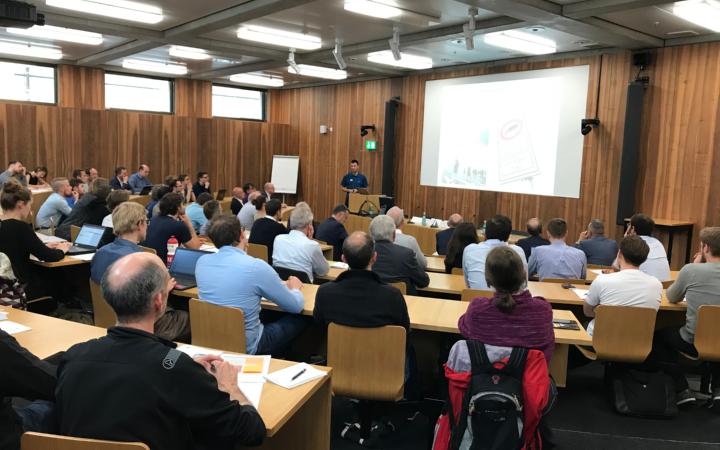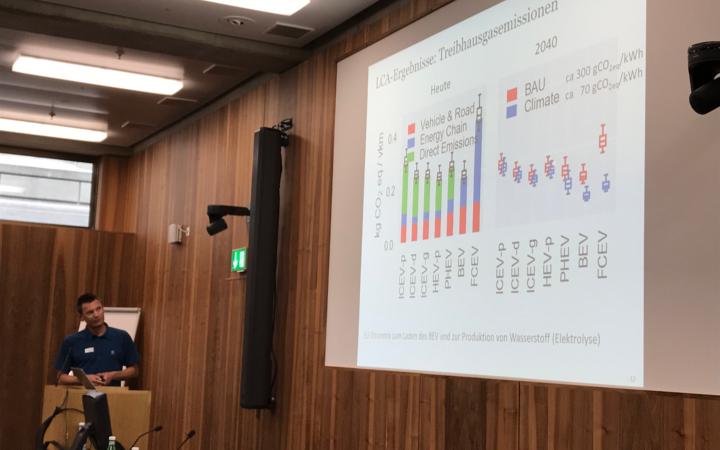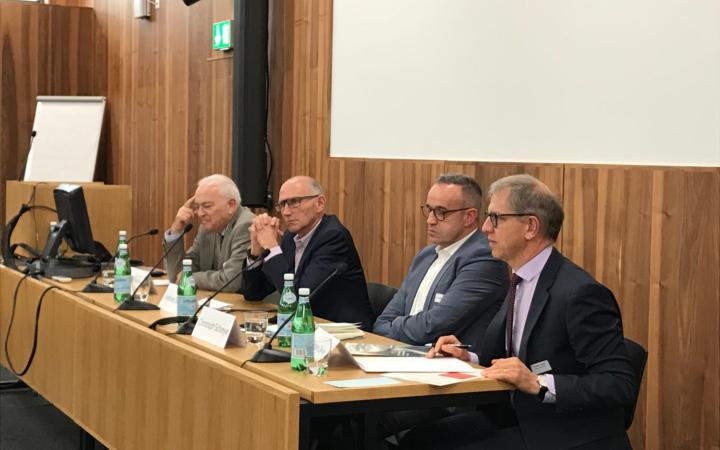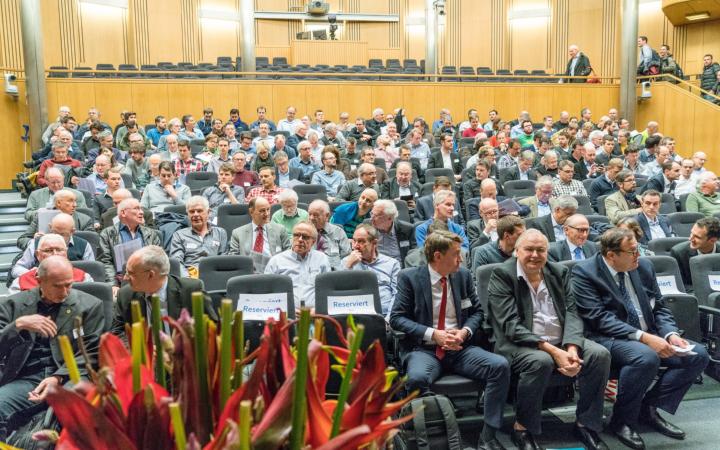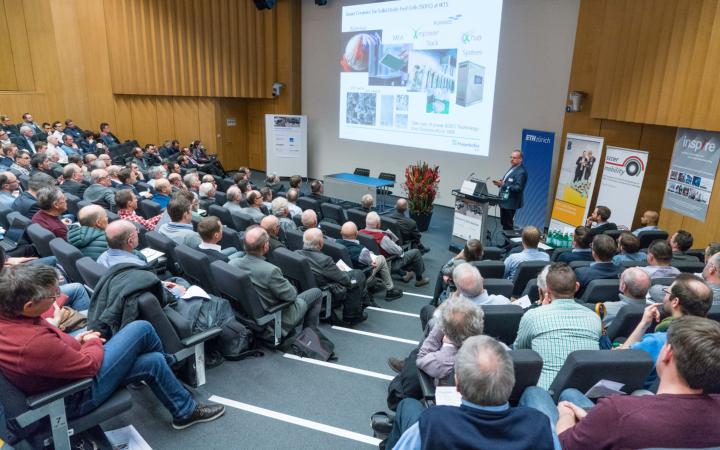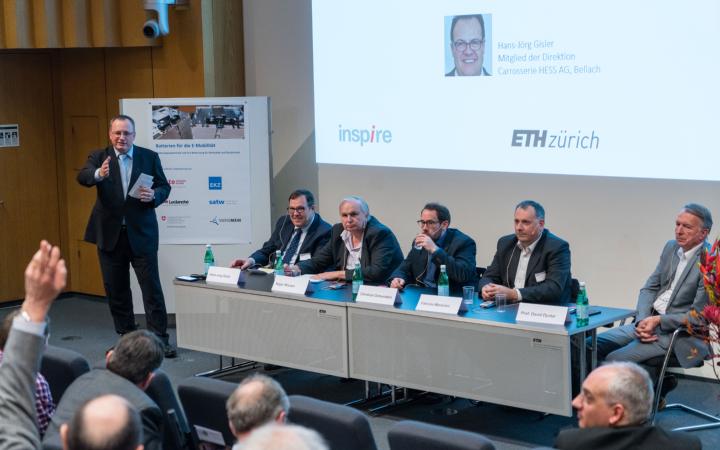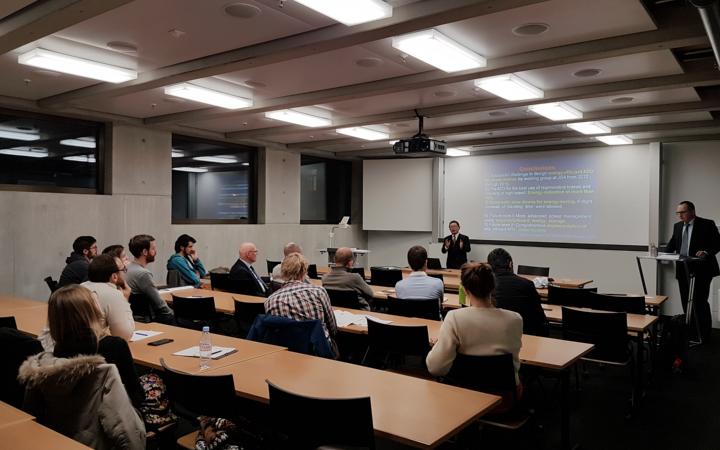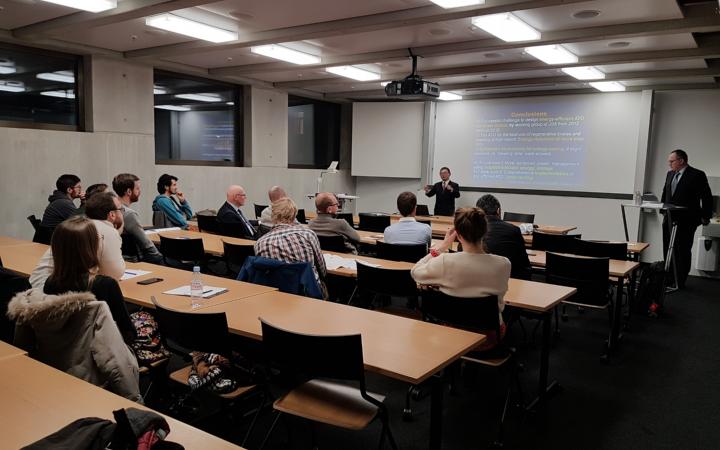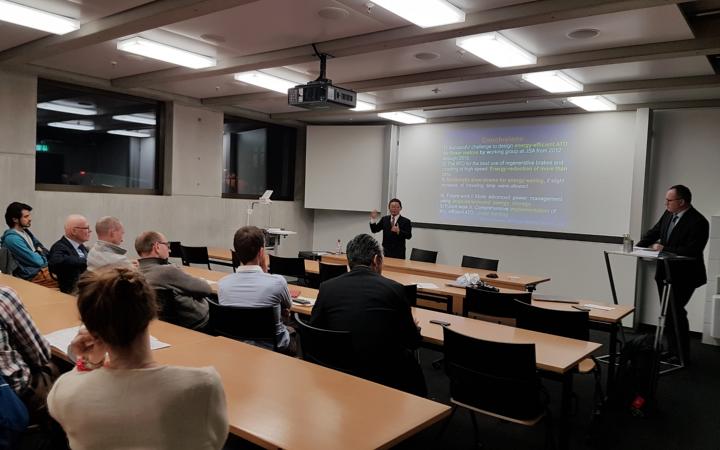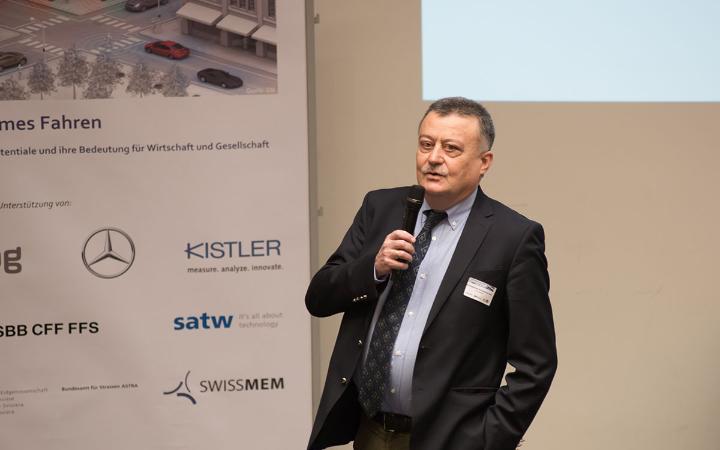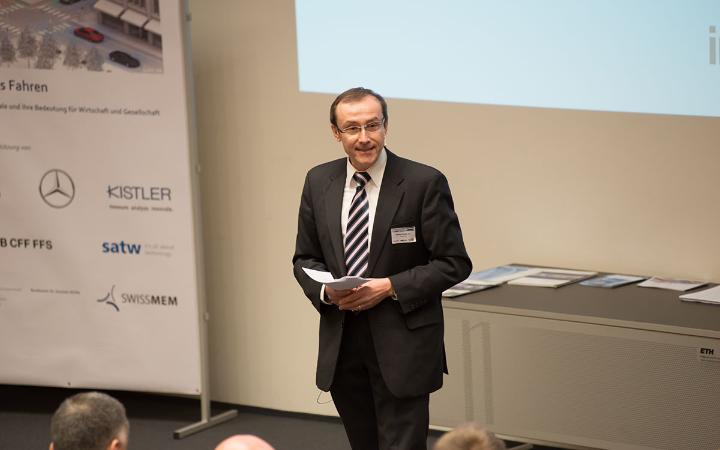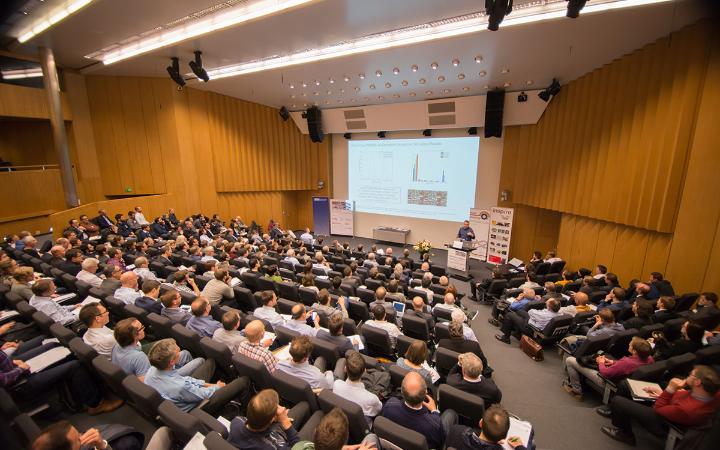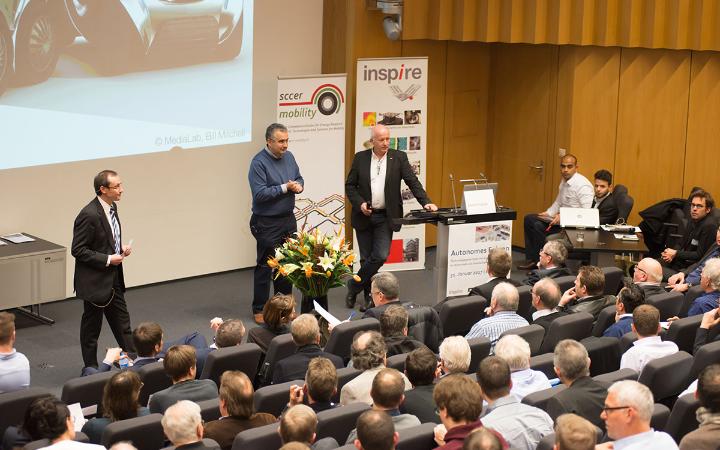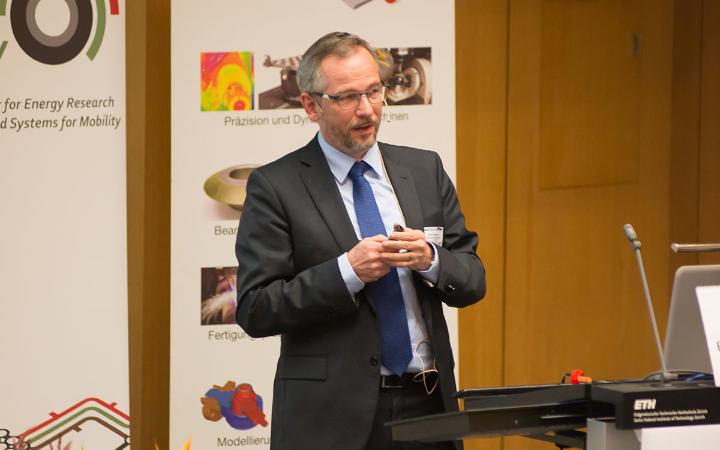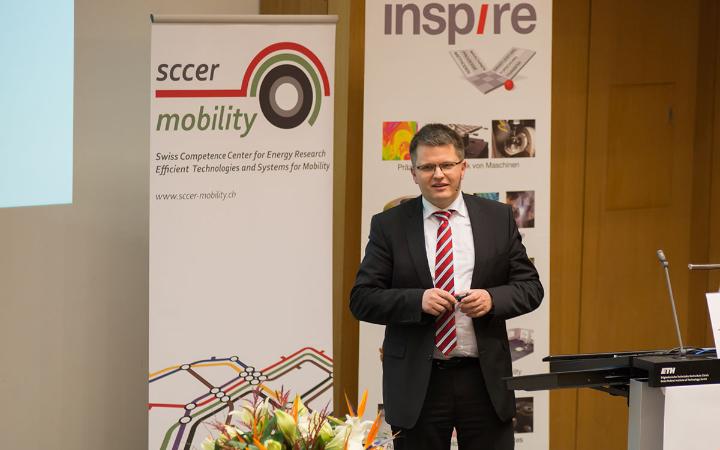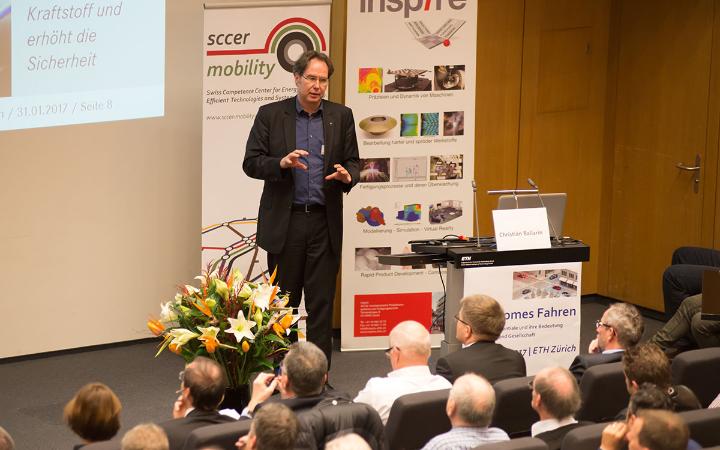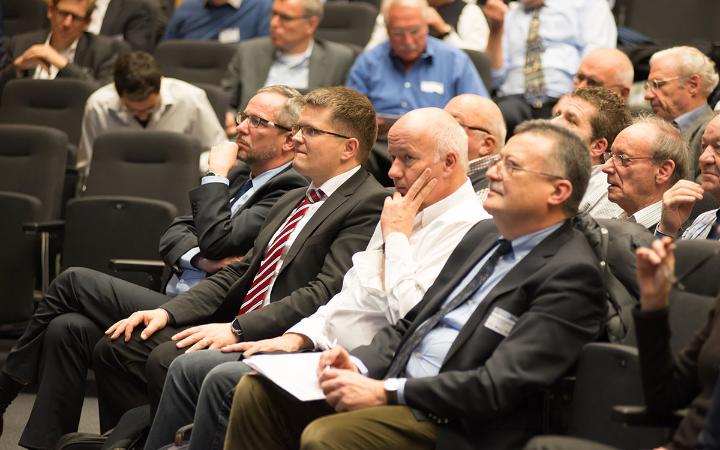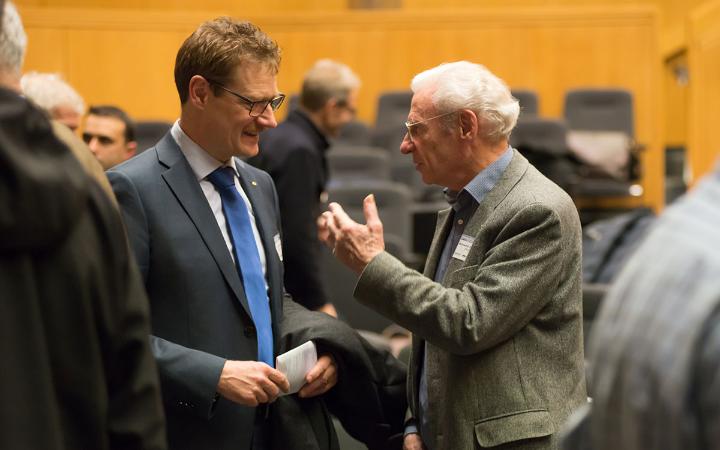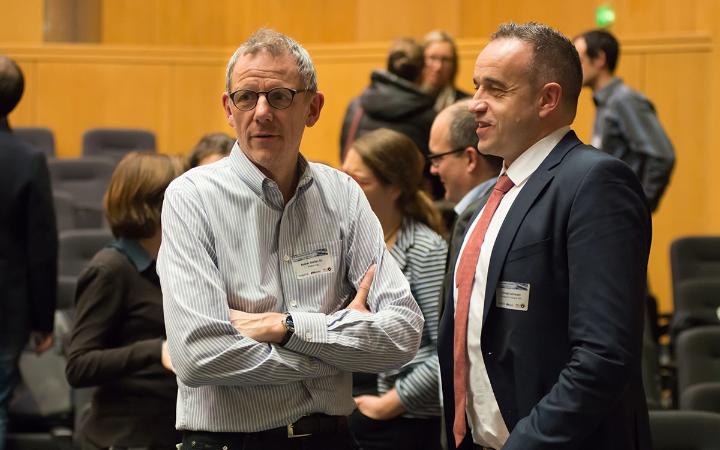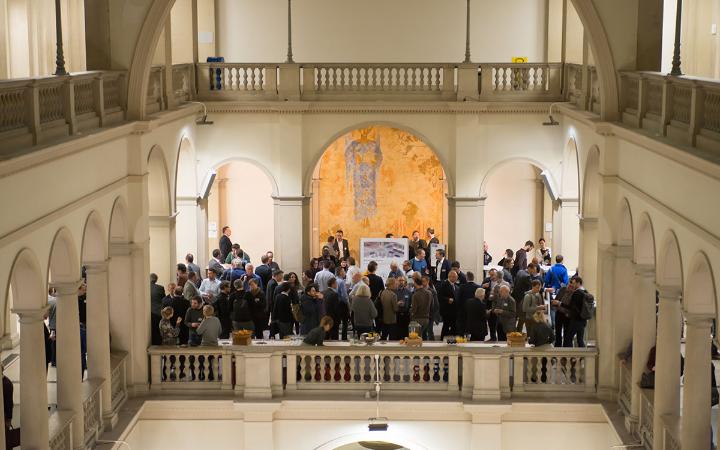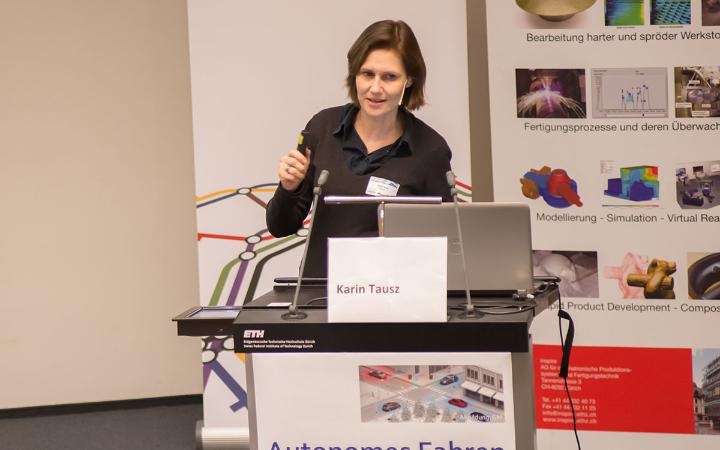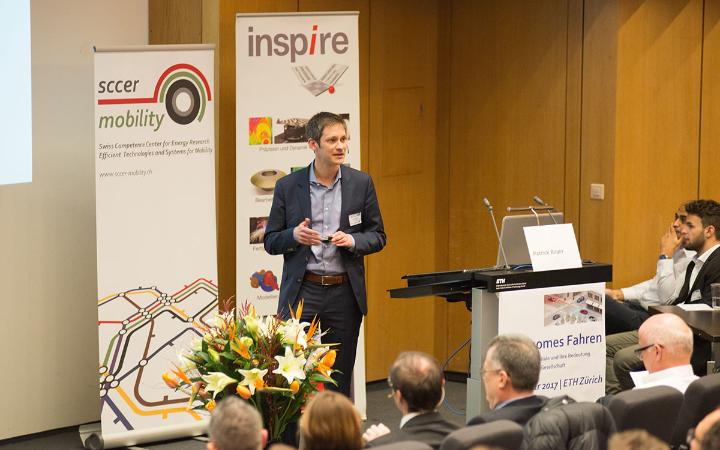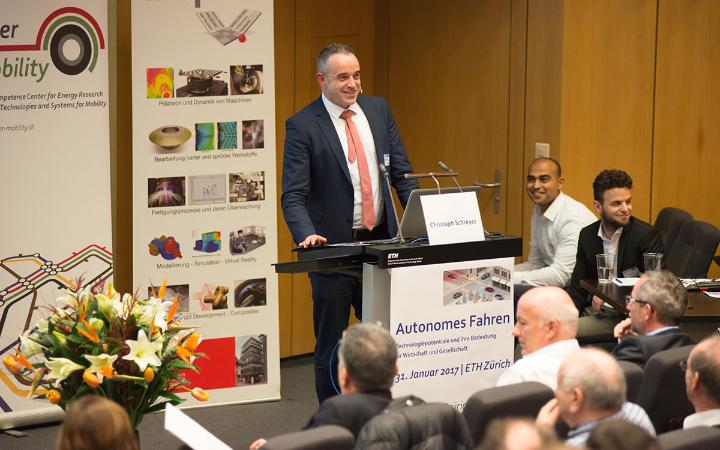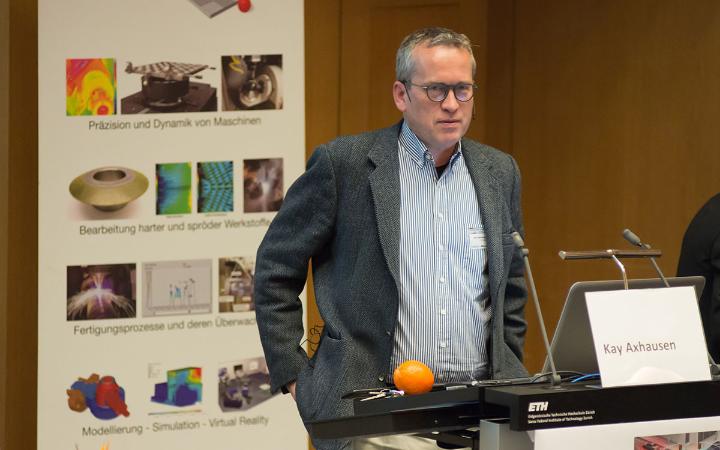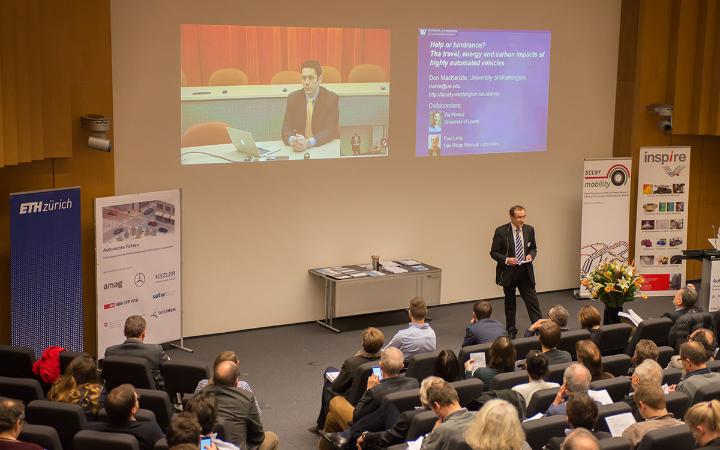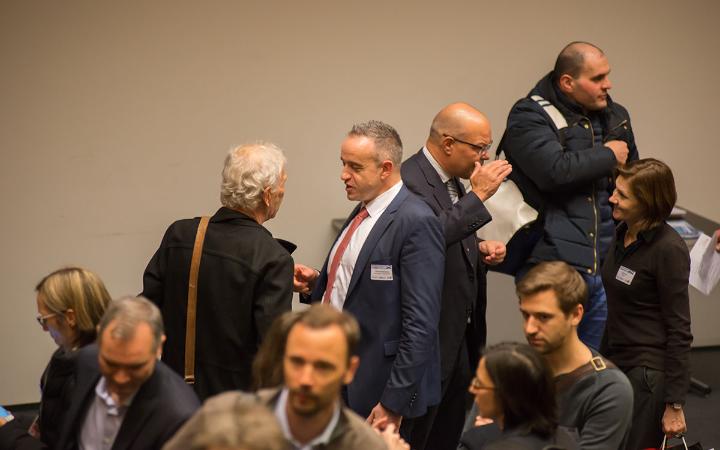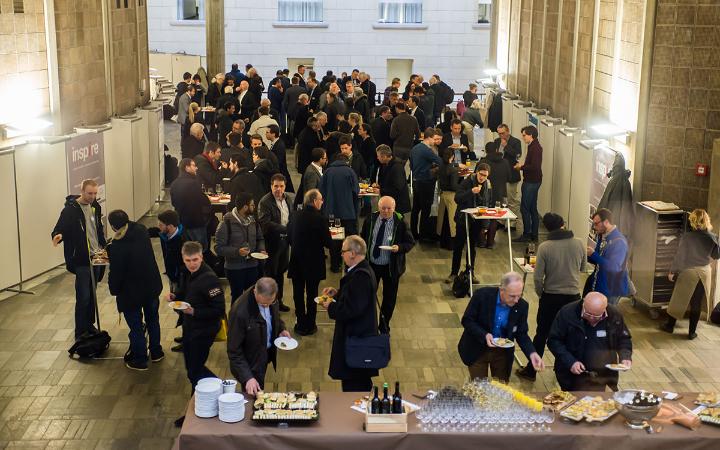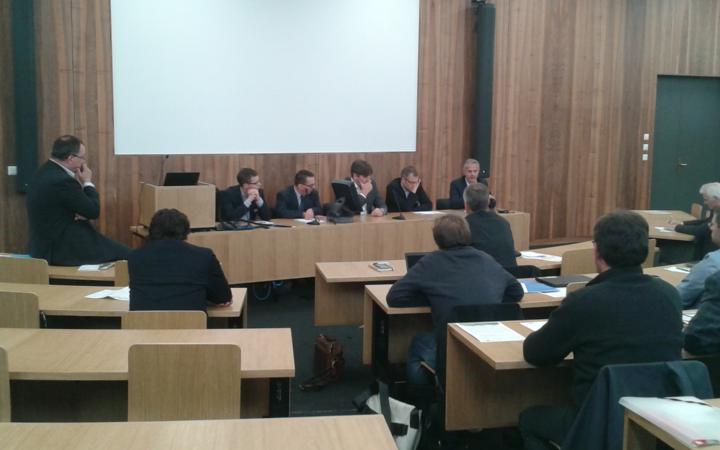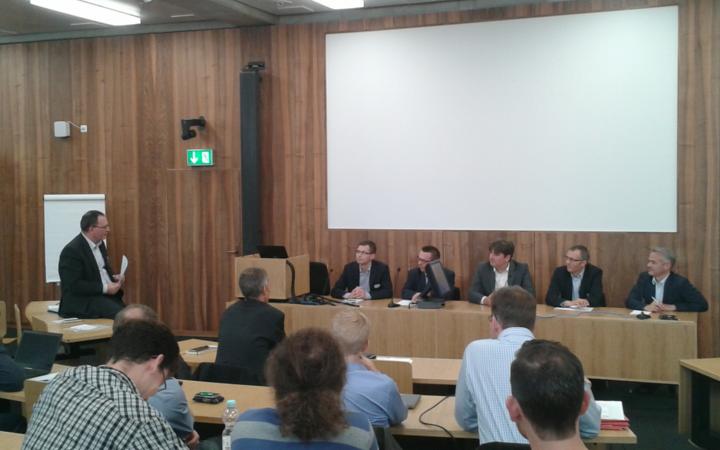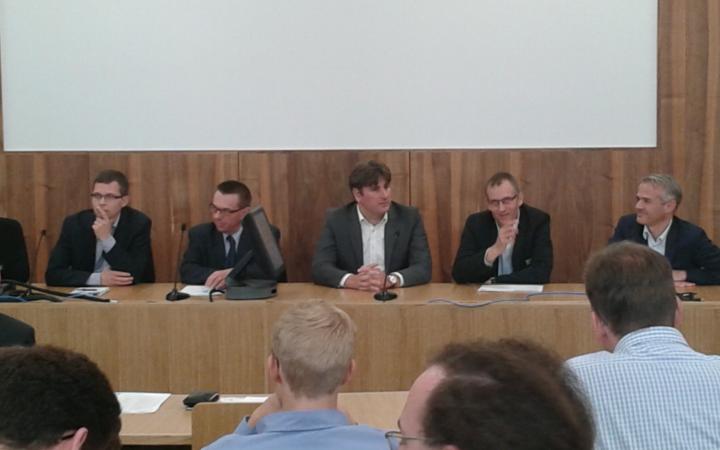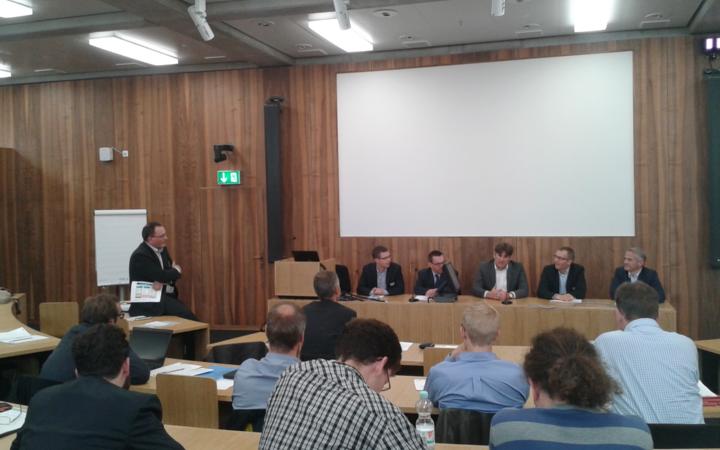Seminars and Transfer Events
Second-Life Conference
12 September 2019, 9:00, ETH Zurich, ML E 12
Together with Ökozentrum, Swiss Center for Electronics and Microtechnology (CSEM), Bern University of Applied Sciences, the Energy Science Center of ETH Zurich and Empa, SCCER Mobility co-organized the first Swiss Second-Life Conference welcoming over 80 participants. The event tackled the issue of second life battery applications. As global battery production for electric mobility will increase tremendously in the coming years, second life applications have a huge potential. However, barriers for developing second life products are still very high. For the first time, the event gathered experts from industry and academia to address this critical challenge and discuss solution approaches.
Public event: Environmental impacts of new mobility technologies
2 May 2019, 16:15, ETH Zurich, LEE E 101
What are the environmental impacts of current and future mobility technologies and how severe are they? Is electromobility really the most sustainable solution and what are the requirements for this? The Laboratory for Energy Systems Analysis (Paul Scherrer Institut, PSI) investigated these and other questions in the background report and fact sheet “The environmental burdens of passenger cars: today and tomorrow” on the basis of life cycle assessment. In this context, SCCER Mobility organized this public event. Christian Bauer from PSI, one of the authors and invited guest speaker, gave insights into the methodology, results and conclusions of the report as well as ongoing updates. In the following panel discussion, experts, representing different stakeholders and interests, reflected critically upon the input talk and debated its relevance for Switzerland. The following experts took part as panelists:
- Andreas Burgener, Director auto-schweiz
- Stefan Hirschberg, Senior Advisor PSI
- Christoph Schreyer, Head Mobility Section BFE
- Christian Zeyer, Director swisscleantech
Presentation Christian Bauer (PSI)
Swiss automotive (suppliers) industry report launch
17 January 2019, 13:30, University of Zurich, KOL-F-117
The swiss Center for Automotive Research (swiss CAR), founded in 2005 and part of the Professorship for Technology and Innovation Management at the University of Zurich, conducts empirical research on the Swiss automotive industry. The center tackles research questions that are highly relevant for this industry and maintains close relationships with corresponding stakeholders, giving researchers access to a vast pool of empirical data. In January 2019, swiss CAR published its newest report analyzing the status and trends of the Swiss automotive and suppliers industry. At the launch event, Anja Schulze, head of swiss CAR, highlighted the newest findings of the study. She stressed that today technological development is the dominant theme of the global and Swiss automotive industry. Speakers also included SCCER Mobility members Konstantinos Boulouchos and Christian Bach. The presentation by Konstantinos Boulouchos outlined how research activities of SCCER Mobility contribute to the Swiss Energy Strategy in light of national and international developments. Christian Bach gave details on how a post-fossil mobility system could be shaped and which technologies will be in competition with each other to achieve this. Christian Fischer (Bcomp), Philippe Monnier (WayRay) and a representative from the Swissmem Automotive Section participated with input talks as well. For more details, please refer to media contributions by SRF and NZZ. If you are an SCCER Mobility member and are interested in reading the report, contact Kirsten Oswald until 28 Feb.
Academia-Industry Dialogue: Decarbonizing the freight sector in Switzerland
29 November 2018, 14:30, ETH Zurich, LEE E 308
Following air freight, transporting goods on the road is the most energy intensive freight mode per ton km and it is fueled almost exclusively by fossil energy carriers. Electrification and renewable electricity are expected to change the energy intensity in the case of cars on the mid-to long-term. But for heavy-duty vehicles, achieving useful autonomy ranges using battery electric propulsion is challenging due to the lower energy density of batteries. One possible workaround is to (re)charge vehicles during operation, e.g. using electric road systems (such as overhead lines or dynamic wireless charging systems), opportunity charging or swapping the entire battery. Alternatively, electricity can be converted to synthetic fuels such as hydrogen, thus allowing more energy to be carried on board. All of these solutions promise decarbonization yet they require new, expensive energy infrastructure, interfere with operations and only work if the decarbonization of the electricity supply chain can indeed be guaranteed. Decarbonization may thus be complicated and expensive, but it could also provide opportunities for new business models. To address exactly such questions, SCCER Mobility hosted this Academia-Industry Dialogue to bring together experts from research and practice to discuss possible paths towards decarbonizing the freight sector in Switzerland.
Guest inputs:
- Christian Köbel, Bombardier Primove
- Peter Krähenbühl, FPT
- Georg Weinhofer, Coop
- Men Wirz, BFE
Batteries for E-Mobility
1 February 2018, 13:30, ETH Zurich, Audi Max
The BFH-CSEM Energy Storage Research Centre hosted the event “Batteries for E-Mobility” in collaboration with inspire AG, ETH Zurich and SCCER Mobility. It welcomed over 280 participants, showing that this topic is of high interest and draws a large audience. Dr. Martin Stöckli, COO inspire AG, and Prof. Andrea Vezzini, director of the BFH-CSEM Energy Storage Research Centre, moderated the afternoon of talks, presentations and discussion. Six invited guest speakers from i.a. Empa, Fraunhofer Institut IKTS and Swiss Safety Center AG, focused on topics including challenges of the energy transition concerning mobility, state of the art research on lithium ion batteries and well as safety measures and the life cycle assessment of such batteries. Additionally, five companies specialized in batteries and e-mobility highlighted their goals and ambitions in terms of development and optimization of batteries, battery electric vehicles and opportunities for these technologies in the current and future market. A panel discussion concluded the event and the audience had the chance to ask questions to the panel experts.
SCCER Mobility Seminar: Challenges of Energy-Saving Automatic Train Operation by Maximal Usage of Regenerating Brakes in Japanese Urban Railways
7 December 2017, 4.15 pm at ETH Zurich, LEE D 105
Prof. Takafumi Koseki, Electrical Engineering Dept., University of Tokyo
Prof. Koseki, who started collaborating with Swiss scientists in 1994, shared insights in the field of scheduling and automatic train operation technology to optimize train energy efficiency. In his research effort, energy-saving running profiles are calculated with the goal of keeping the traveling time constant along with maximizing the use of coasting at high speed and power limiting regenerating brakes. If track profiles are complicated, there is no straightforward way to find the energy-saving running profile. To solve this, Prof. Koseki’s group applies mathematical approaches like parametric control-input optimization and dynamic programming. In the presented experimental case study at a linear metro line in Japan, an energy-saving effect of more than 16 % was achieved in 2015. These results and experiences show technical feasibility of the proposed approach and the challenges that need to be solved for further improvement.
Autonomous Driving
31 January 2017, 1.30 pm at ETH Zurich, Audi Max
Autonomous driving is a topic of increasing importance for society in general and for the transport industry in particular. Semi-autonomous systems are already on the market and fully automated vehicles will most likely drive on our streets in the forthcoming decades. Driverless vehicles are expected to make private travel more convenient and to lower the cost of freight transport. In addition, due to a more efficient mode of operation autonomous cars or trucks are supposed to make transport and mobility more energy efficient and less carbon intensive. However, an unprecedented increase in road traffic volume may easily neutralize potential efficiency gains.
Eleven speakers from industry, academia and public administration covered a wide range of topics: cutting-edge academic research in the field of robotics and control algorithms, product development and user experience in pilot tests, or how the introduction of autonomous driving – and the new Mobility-as-a-Service business associated to it –impacts industry and travel behavior. The conference made clear that the automotive industry, as well as the academic community, are investigating and testing the technology considering evolutionary developments (progressive automatization) and revolutionary development (fully automated vehicles) despite the huge uncertainties still associated with the new technologies. Other challenges identified by the speakers include questions of liability and their consequences for the insurance industry, implications for the logistics business, impacts on public transport or how these insecurities affect governmental institutions that eventually have to regulate autonomous driving. The last section addressed implications for the environment, in particular traffic volume, energy demand and CO2 emissions, and revealed a wide range of potential scenarios. It turned out that the degree to which autonomous driving develops hand in hand with increased car or ride sharing will be crucial for the technology's environmental impacts.
The conference attracted a wide interest with over 250 participants from industry, academia and governmental bodies. The event, which was co-organized by SCCER Mobility, is the forth in a series of public symposia hosted by a consortium of researchers at ETH Zürich, Empa, inspire AG and H2energy.
SCCER Mobility Seminar: The electric vehicle is here (again) - and why it might stay this time!
24 May 2016, 5.15 pm at ETH Zurich, HG E 5
Prof. Dr. Andrea Vezzini, Bern University of Applied Sciences
Head of the BFH-CSEM Energy Storage Research Center
Prof. Dr. Konstantinos Boulouchos, ETH Zürich
Head of the Aerothermochemistry and Combustion Systems Laboratory
Abstract
The current momentum in the electrification of the traditional drivetrain in passenger cars as well as the growing number of pure electric driven vehicles fuels hope for a transition towards a more sustainable mobility. Unfortunately, the advent of electric vehicles has been announced before and failed on its promises. We have therefore to ask ourselves what is different this time, especially what progress has been made or can be expected in the near future to justify this new hype? The first presentation will focus on key technological innovations made in the last years as well as what can be expected in the field of electrical machines, power electronics and batteries.
The perspectives for an increasing electrification of the transport sector are influenced by recent technology advancements on hand but also have implications for the supply side of the required electricity. In the second presentation, we will therefore briefly examine systemic implications of transport electrification through battery electric vehicles, plug-in hybrid electric vehicle technologies and possible paths to be taken with an emphasis on Switzerland.
Together with the seminar, the AMZ race cars were exhibited. This exhibition was organized by the ETH Formula Student Project.
SCCER Mobility Seminar: Need for and Patterns of the Adoption of Disruptive Transportation Technologies
17 November 2015, 2.15 pm at ETH Zurich, LEE E 308
Prof. Dr. Andreas W. Schäfer, University College London
Abstract
This seminar consists of three parts. It starts with an update of the most recent trends in global passenger travel and projects future US mobility levels through 2100 for different scenarios of consumer behavior, technology change, and transport policy. In the absence of radical consumer change, this part concludes a continuous growth in travel demand, especially in air travel. In a next step, the opportunities for and costs of reducing CO2 emissions from passenger aircraft, the fastest growing transport mode, are discussed. Although significant cost-effective fuel burning and CO2 emission reduction potentials are identified, they likely continue to be outpaced by future demand growth. A number of potentially disruptive transportation technologies already exist or may become available in the near future. To better understand the conditions under which they could be adopted on a large scale, the final part of this seminar presents initial results from a study examining the adoption characteristics of past disruptive transportation technologies.
Biography
Andreas W. Schäfer is a Professor of Energy and Transport at the UCL Energy Institute, University College London, and a Visiting Professor at the Precourt Energy Efficiency Center at Stanford University. His publications cover the demand for and supply characteristics of energy and transportation systems. In addition to peer review journals, his work was published in popular science magazines, such as Scientific American. He is lead author of “Transportation in a Climate-Constrained World”, MIT Press (June 2009). Prior to joining the UCL Energy Institute, he held appointments at the International Institute for Applied Systems Analysis (IIASA), the Massachusetts Institute of Technology, the University of Cambridge, and Stanford University. He holds a MSc in Aerospace Engineering and a PhD in Energy Economics, both from the University of Stuttgart, Germany.
Academia-Industry Dialogue: Energy Storage on Locomotives and the Railway System
1st October 2015 at ETH Zurich
The first Academia–Industry Dialog has been very successful. All members of Capacity Area A1 (e-mobility batteries) and members of Capacity Area B1 were able to meet the most important representatives of the Swiss railway companies. Visitors even came from abroad (Mannheim, Bombardier) und numerous representatives of SBB were present. The following people have attended the dialogue:
- Christian Gerster, Head of Products & Engineering, Propulsion & Controls at Bombardier Transportation
- Christian Köbel, Director Primove Product Management
- Urs Bikle, Member of the Board at Stadler Rail AG, Bussnang
- Markus Häusermann, Division Manager, Project House at Siemens
The following important results have emerged from the discussion for SCCER Mobility CA A1:
- Opportunities for energy storage in the track material lie mainly in diesel electric locomotives. Bombardier, in particular, is a pioneer in this field.
- Autonomous driving is an almost more important subject in railway transportation than on the road. All systems (security) are actually available and the benefit (energy) is quantifiable. SCCER together with SBB could be playing a leading role here.
- Autonomous driving on the road is a threat to the public transportation business case as the road is getting more and more resource (time) and energy efficient on the one hand and independence in terms of time makes it extremely attractive on the other hand.
- Energy efficiency and public transportation is also an issue with regard to the provision of energy. Accordingly, losses in the net play a major role. If transportation losses are high, storage, e.g. at the side of the tracks, plays an increasing role. This should be investigated (Weidmann).
Presentations (for SCCER Mobility members only)
Innovation Roadmap Workshop
21 August 2014 and 19 September 2014, ETH Zurich
The goal of the two-day workshop was to define a common vision for SCCER Mobility, develop an overarching roadmap and initiate the discussion between our Capacity Areas.
As a result of the workshop we developed a methodology, launched interesting group discussions and compiled a list of needed interactions between the Capacity Areas. We identified key factors for the success of our Competence Center and draw up a guide of further research effort.
For documentation of the workshop please consult the Intranet (SCCER Mobility members only). For other information please contact
Dr. Gloria Romera, Program Manager at SCCER Mobility: gloria.romera@sccer.ethz.ch, 044 633 80 06.
!!! This document is stored in the ETH Web archive and is no longer maintained !!!
